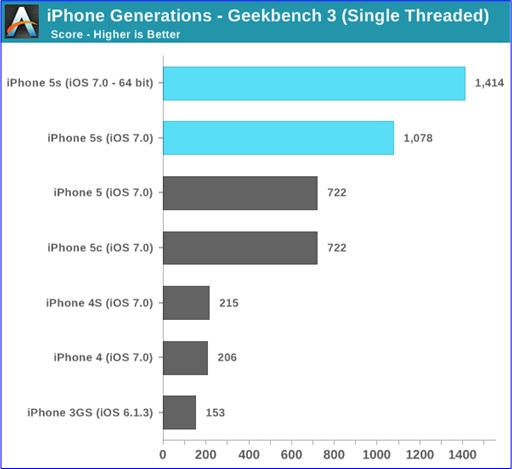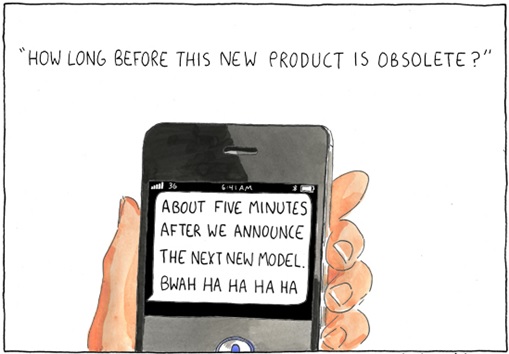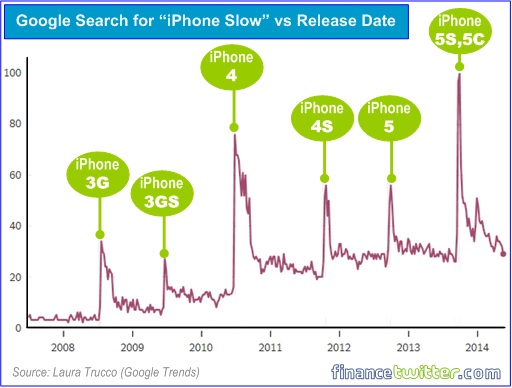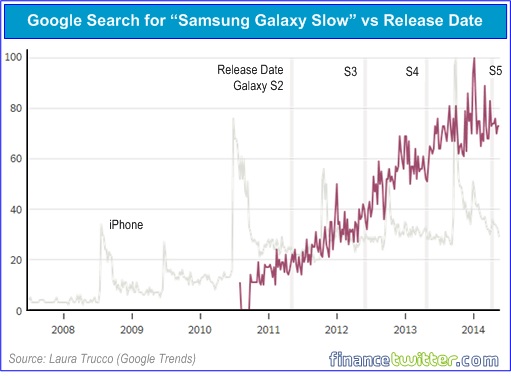This is not a global puzzle that requires a resurrection of Albert Einstein to solve it. Can someone explain why every time after a major iOS upgrade, my iPhone slows down tremendously, so much so that the smartphone seemed to be unresponsive? Apple fanatic fans would laugh at such question and conveniently point to Microsoft as an example – how can you run Windows-7 on Windows-95 machine?
That would be the standard answer, so basically you shouldn’t run the latest iOS 7.x on a A5 chip (iPhone-4S), let alone A4 chip in iPhone-4. Hence, if you’re still using iPhone-4 today with iOS 7.x, you can blame nobody but yourself. Well, actually if you’re still using iPhone-4 running on iOS 7.x, you’re a real hero because it shows you can actually survive in a tough world, without giving in to Apple’s evil oppression (*grin*).
Here’s the mumbo-jumbo logic or explanation behind performance degrading every time there is a major software upgrade, be it Apple’s iOS or Microsoft’s Windows. On every hardware release they tend to upgrade the chips and they are faster every time they are released. Naturally, latest operating system is always tailored and customized to the newest chip processor without much concern about older hardware. And in the process, it would not perform efficiently in the old devices.
If the above is not enough to convince you that Apple Inc. (Nasdaq: AAPL, stock) is not evil, here’re some bells and whistles to confuse you further – new iOS comes with new features, demanding better graphics and visual effects and what not, not to mention thousands more new coding packed into it. Really? How about “built-in obsolescene”, an industrial design policy planned to make a product with a limited useful life so that it become obsolete within a period of time?
The debate over whether Apple deliberately slow its old iPhone models before a new release have been the talk ever since. And with the pending release of iPhone 6 in couple of weeks, the conspiracy theories are running wild again that iPhone 5 would be crawling while iPhone 4 would be as good as dead. So, here’s another proof that Apple is evil and deliberately optimize their new iOS to be inefficient with older models thus forcing you to buy a new model.
According to Google Trends and Ph.D. Harvard economics student Laura Trucco, below charts are perhaps the best proof, or at least indicator, how older iPhone models experienced slowness every time Apple release new iOS, which traditionally would be made available during a new model release, the next being iPhone 6. People search for “iPhone slow” in the six distinct spikes on the chart, correspond to releases of the past six new iPhones.
One can’t simply resist the conspiracy theories because if you map the spikes in google search for “iPhone slow” on another chart where people search for “Samsung Galaxy slow”, there was no such spike whatsoever in the latter. The explanation is easy – while Apple is motivated by dollars and cents to make their older model slower and obsolete, the same cannot be said about Android phones. Sure, Android phones will get slower eventually but not to the extreme as iPhones.
Of couse, Apple will not comment or will simply rubbish such co-relation between new iPhone model and iOS release resulting in slowness in older phones. And since iOS is a highly guarded secret as compare to Android which is free and open, there won’t be concrete proofs that Apple has been tweaking its coding deliberately to slow down older iPhone models, for now. There’re two things consumers can do nevertheless – do not upgrade their iPhone with the next major iOS release; or simply “don’t buy iPhone”.
Other Articles That May Interest You …
- The Pirate Bay Is Making It Easier To Download Movies On SmartPhones
- Apple & IBM Announced Exclusive Partnership. Here’s Tim Cook’s Memo To Employees
- Take A Peek Inside A SmartWatch. Is LG’s G Watch Worth $229?
- Here’re The Lives Of The Rich Kids – From Private Jet To £11K Rolex (Photos)
- 50 Cool Signatures Of World’s Rich & Famous People
- Apple’s iWatch To Come With 10 Sensors, Different Sizes & Designs

|
|
July 30th, 2014 by financetwitter
|


|

|

|

|

|

|
































Comments
Add your comment now.
Leave a Reply